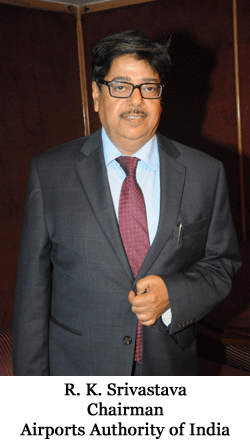
Air cargo stakeholders all across India are hoping that 2016 will be the year when air cargo will be viewed not merely as a money-spinner, but also as a separate entity with as much respect passenger services command.
That hope comes from government moves to boost cargo.
The Ministry of Civil Aviation (MoCA) and the Airports Authority of India (AAI) have initiated programs that will help the growth of air cargo—both domestic and international—in the country.
RK OK’s Growth
 Talking to ACNFT, Chairman R. K. Srivastava said he was confident that the steps to improve cargo handling would usher in development in regions untouched until today, and that these initiates would also facilitate trade. Talking to ACNFT, Chairman R. K. Srivastava said he was confident that the steps to improve cargo handling would usher in development in regions untouched until today, and that these initiates would also facilitate trade.
One of the first moves by the government that will help cargo is the establishment of a cargo hub—the first one—in Chennai.
The airport authorities have given the charge to RITES Limited (a government of India enterprise that has experts from engineering and management) to prepare a Detailed Project Report (DPR) on how the airport could be turned into international air cargo hubs (according to the AAI, the Ministry of Civil Aviation has proposed creation of air cargo hubs at the six major airports: Delhi, Mumbai, Chennai, Kolkata, Bengaluru, and Hyderabad airports).
The reports are expected later this month (January 2016).
While Delhi airport is privately managed and operated, Chennai is the only metropolitan international airport under the management of the AAI.
The annual handling capacity of the airport is 1,102,373 MT and in 2014-15, it had handled 303,904 MT.
Looking For Clear Cut Policy
Meanwhile, air cargo stakeholders are also looking forward to the release of the much-awaited National Civil Aviation Policy.
It is hoped that the government will, in all likelihood, give ‘infrastructure’ status to air cargo provided that all related support facilities operate on the airport.
If that happens, air cargo establishments would receive tax benefits under Section 80-IA of the Income Tax Act, which provides a 10-year tax holiday for infrastructure projects.
Chairman Srivastava said that since there was “enormous potential for growth of air cargo in India, it is our endeavor to take advantage of the situation by providing cargo facilities even at second-tier cities in India, which should also meet the principles of hub and spoke for overall development of all regions in India.”
AAI To Handle Cargo
AAI, he said, had planned to start handling domestic cargo “in a full-fledged manner, which will also integrate the far-flung areas and regions for development of air cargo, thus facilitate trade in the process.” Accordingly, he said, “24 airports across the country have been identified for this purpose.
The objective,” he said, “was to create the basic infrastructure at AAI airports having potential for air cargo growth by creating Common User Domestic-cum-Cargo Terminals.”
Cutting Dwell From Hell
Also very large on the agenda is an effort by the Air Cargo Logistics Promotion Board (ACLPB) to create a detailed, workable plan to reduce dwell time of air cargo from ‘aircraft to truck’—first by less than 24 hours by December 31, 2016, then down to six hours by December 31, 2017.
Perhaps what is important to note is the decisive change in the thinking of the AAI. Srivastava pointed out that AAI “firmly believes that an open and constructive dialogue between global and national entities and between industry and regulators will lead not only to mutual learning and understanding, but to a leaner, more agile, robust, effective, and secure processes.”
This would, in turn, boost the economy and better the living conditions of the people.
Other Moves
Quite a few provincial governments have sent in their objections to the Draft National Aviation Policy.
The States of Maharashtra (which includes Mumbai airport), Tamil Nadu (with Chennai Airport), Rajasthan, and Odisha have demanded that the policy should do away with one of the provisions that states that international and cargo airlines can only land at the six major airports.
In fact, states like Odisha and Rajasthan have asked why the six airports should get preference.
Though no official reaction to the objection has come from MoCA, those who have been handling the policy have said that there were objections when the provision—that airports at Delhi, Mumbai, Kolkata, Chennai, Hyderabad and Bengaluru would be the international and cargo hubs—was being included in the draft policy.
After the objections that have been raised by the States, the provision would be deleted totally because there could be no discrimination between the states especially when a number of airlines have been asking for rights to touch more Indian cities.
Tirthankar Ghosh |



